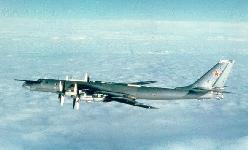
IAN BAILEY
From Wednesday's Globe and Mail
October 3, 2007 at 12:33 AM EDT
VANCOUVER — Canadian fighter jets have twice been dispatched in recent weeks to monitor Russian
bombers that have conducted training missions near North American airspace as part of a surge in such
activity, officials with the North American Aerospace Defence Command said yesterday.
The Canadian actions, involving CF-18 Hornet jet fighters from Cold Lake, Alta., were among seven military
exercises involving Russian Tu-95 Bear heavy bombers, which have caught NORAD's attention.
U.S. aircraft responded to the other five situations.
The flights come amid concerns about a Russia newly bullish about testing its military abilities, a posture that
has prompted such flights in Europe as well. Continued:
Russian Bombers Trained Off Alaska Coast
ANCHORAGE, Alaska —
Russian warplanes staged at least seven exercises outside U.S. airspace
near Alaska
this summer, and each time U.S. or Canadian fighter jets
were dispatched to escort them, U.S. military
officials said Monday.
The latest exercise came Sept. 19 and involved two planes flying
somewhere off the coast of Canada, said
Maj. Allen Herritage, a
spokesman for the Alaska region of the North American Aerospace Defense
Command.
They were met by Canadian planes from NORAD, which is jointly operated by the U.S. and Canadian
militaries.
At least five exercises by the Russian Tu-95 Bear heavy bombers have
taken place off Alaska's Aleutian
Islands and other historic Cold War
outposts, such as Cape Lisburne and St. Lawrence Island, according to
NORAD records.
All occurred beyond the 12-mile boundary that constitutes U.S.
airspace and have involved two to six
aircraft. Each time, Russia
alerted the U.S. through reports in Russian news agencies, Herritage
said.
The bombers have been met by fighter jets, usually F-15s.
"They used to have them from time to time, but not nearly in this
frequency," Herritage said. "These
exercises used to be more common
during the Cold War."
The exercises come amid troubled relations between Russia and the
West and are seen by some as
intimidating moves by an increasingly
assertive Russia, but Herritage said the exercises are not a cause for
alarm. Continued:
http://www.theglobeandmail.com/servlet/story/RTGAM.20071002.wbuzzed1003/BNStory/International/home
Associated Press Writer
=============================
EDIT: COPYRIGHT. PLEASE POST
ONLY 4 OR 5 PARAGRAPHS FROM
THE COPYRIGHTED NEWS SOURCE
PER DU RULES.
Note: All Tu-95s now in Russian service are the Tu-95MS variant, built in the 1980s and 1990s With the
reopening of the BEAR production line, the Soviets began producing a new, upgraded variant of the BEAR
turboprop bomber, thereby increasing their long-range bomber force.
BEAR H16 - TU-95MS16 -- The TU-95MS16 carried six missiles inside the fuselage and 10 missiles
underneath the wings. This entirely new variant of the BEAR bomber - the BEAR H - became the launch
platform for the long-range Kh-55 [AS-15] air-launched cruise missile.
BLOG COMMENTS POWERED BY DISQUS









